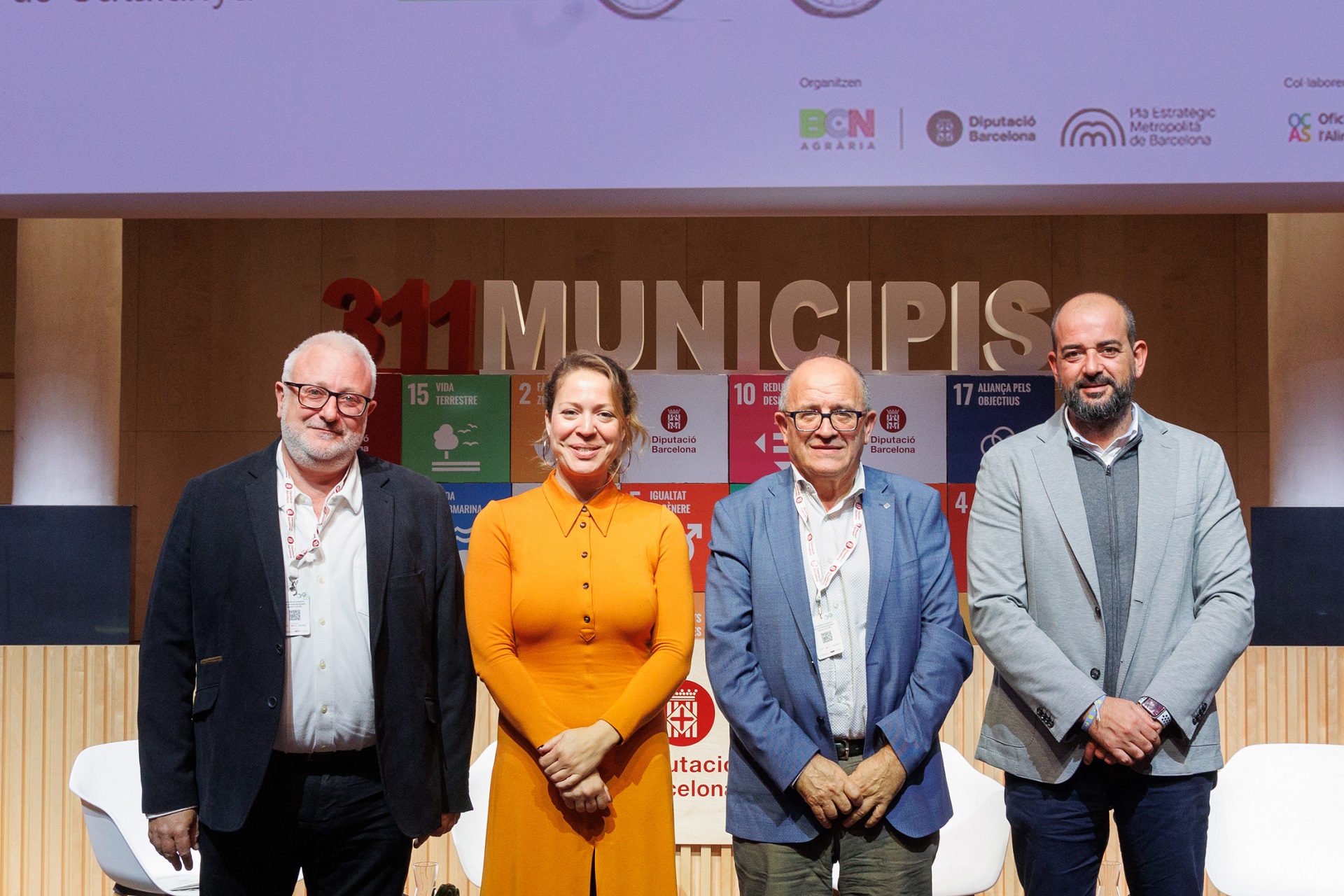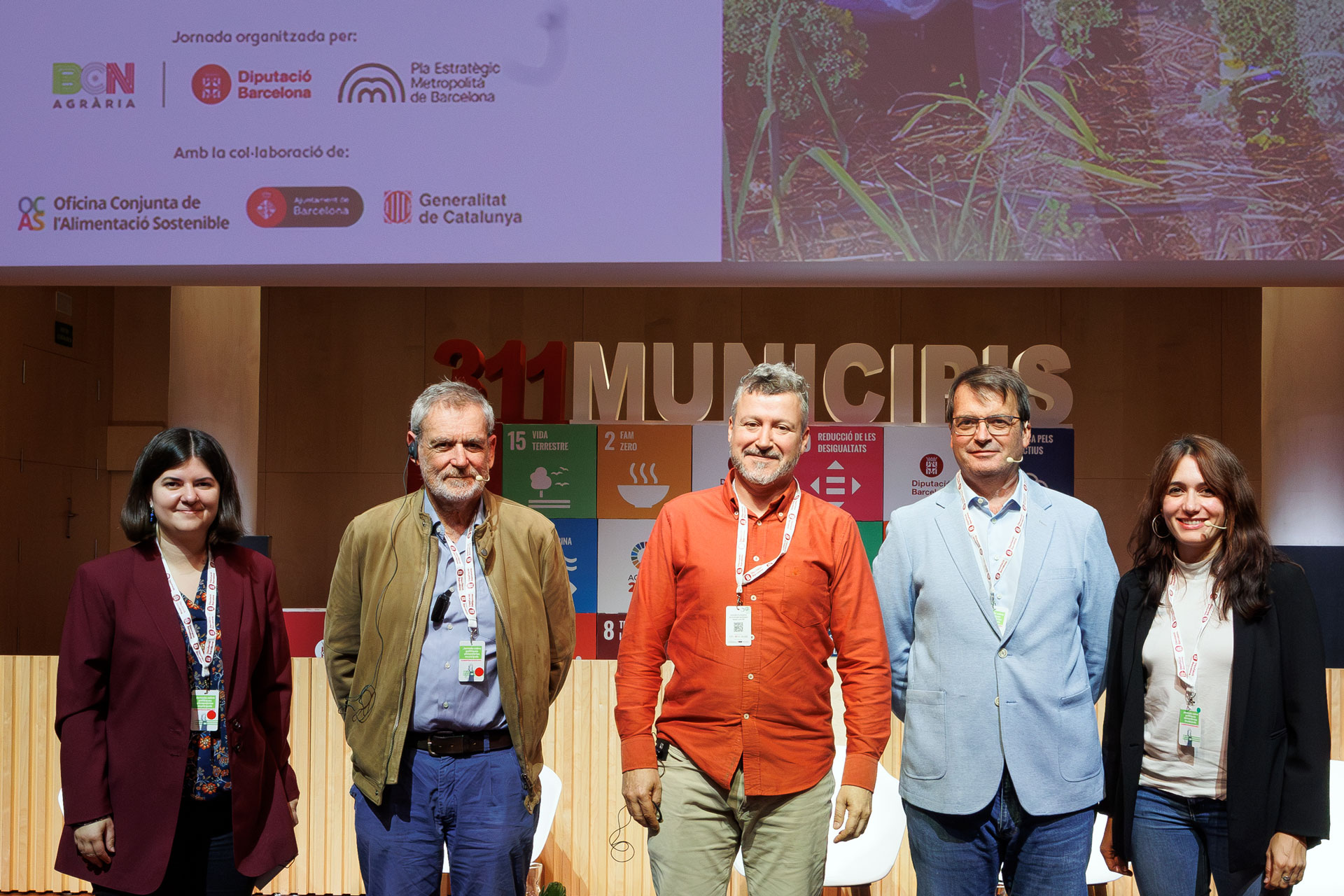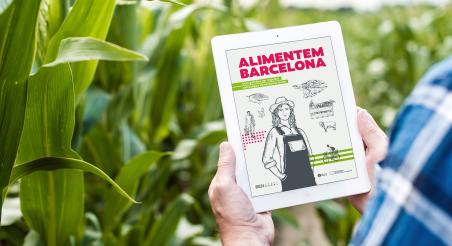Yesterday, the Barcelona Provincial Council hosted a landmark conference on municipal food policies. Under the title ‘Alimentem Barcelona’ (‘Feeding Barcelona’), it brought together a wide range of Catalan public administrations with food-related competencies in an unprecedented event for its scope and collaborative nature. Jointly organised with the Barcelona Metropolitan Strategic Plan (PEMB) and in collaboration with the Joint Office for Sustainable Food (OCAS), the Government of Catalonia, and Barcelona City Council, the event gathered over 200 participants, mainly councillors and technical staff from municipalities and other local authorities in the province. The conference featured contributions from national and international experts who shared valuable insights into transforming local food systems.
“The management of agrarian spaces is one of the great challenges we face in the province of Barcelona,” stated Xesco Gomar, Deputy President of the Natural Spaces and Green Infrastructure Area of the Barcelona Provincial Council. He stressed that supporting agricultural spaces is “a 365-day-a-year commitment” that must be reflected in budgets.
Janet Sanz, Chair of the Executive Committee of the Barcelona Metropolitan Strategic Plan and Vice President for Climate Action at the Barcelona Metropolitan Area, shared alarming statistics about the current situation: “In the last 60 years, we have lost between 60% and 80% of metropolitan agricultural land.” Sanz highlighted that the metropolitan area produces only 2% of the fruits and vegetables it consumes and 0.5% of its meat, exposing “a significant dependency on external sources.”
Voices for strategic transformation
Josep Montasell, co-founder of the Lower Llobregat Agrarian Park, emphasised the importance of emotional connection with the environment, noting that “proximity is not about what is physically closest but what feels nearest to us.” Anna Roca, a consultant on agri-food projects, highlighted the need to coordinate municipal initiatives through dialogue, stating that “municipalities are already taking action, but these efforts should be better integrated with other stakeholders.” Roca underscored the urgency of reducing food dependency and argued that food strategies in smart cities are crucial for ensuring food security, especially for vulnerable groups.
Sònia Callau, Head of the Agrarian Territorial Directorate at the Barcelona Provincial Council and the Barcelona Agraria programme coordinator, urged municipalities to develop their own food policies. “Food intersects with many municipal policies; it is inherently cross-sectoral. We must move towards a healthier, more sustainable, and more localised model,” she asserted. Callau also highlighted key data about the region's food system: across the 311 municipalities of the province, 18 million meals are prepared daily, 35 kilograms of food are wasted per person annually, and the food sector accounts for 30% of greenhouse gas emissions. She encouraged municipalities to leverage their competencies in areas such as water supply, food control, waste management, markets, environmental protection, urban planning, and consumer protection to drive food system transformation.
A pioneering collaboration model
The conference showcased several innovative initiatives, including the Joint Office for Sustainable Food (OCAS), a pioneering inter-administrative tool that coordinates efforts across different territorial institutions. Joan Gòdia, Director General of Agri-food Companies, Quality, and Gastronomy at the Catalan Government, announced that “more than 50% of food must be locally sourced” and emphasised the importance of advancing the future Catalan Food Law. This law will establish a transformative regulatory framework to ensure access to healthy food, equity in the food chain, and food security across the territory.
Meanwhile, Màxim López, General Manager of the Municipal Markets Institute, highlighted Barcelona City Council's long-standing efforts in this domain: “For 30 years, the council has made municipal markets a way to connect with our environment.” López stressed the need for an integrated approach: “We must find ways to unite all stakeholders, from producers to consumers, considering the entire chain.”
Inspiring experiences
International examples demonstrated that transforming urban food systems is not only possible but essential. Elisa Porreca, Food Policy Manager at Milan City Council, explained how the Italian city has reduced red meat consumption in school canteens through a comprehensive strategy involving teacher training and family workshops. Similarly, Philippe Lemanceau from Dijon Métropole presented an innovative territorial pact that bridges the urban-rural divide, creating synergies between local producers and the hospitality sector.
Josep Manuel Pérez, a representative from Valencia, highlighted the city’s role in networks such as Municipalities for Agroecology and shared the experience of consultative food sector councils, which have enabled cross-sectoral governance with social agents and professional organisations. From Barcelona, Manel Torrent emphasised that joining the Milan Urban Food Policy Pact was a starting point for developing the Barcelona 2030 strategy. This has led to the creation of the OCAS as a coordinating instrument to promote a healthier, more sustainable food system for all residents.
One of the conference's standout moments was Gisela Varias' presentation of Terra Pagesa (‘Farmer’s Land’), an initiative by Unió de Pagesos in collaboration with various administrations. Varias described an innovative project that encourages the marketing and consumption of seasonal, locally sourced products from small and medium-sized Catalan farmers.
Mentoring workshops
The conference concluded with a series of mentorship workshops on local food policies, exploring four key stages: groundwork preparation, drafting a food charter, creating a food plan, and establishing food councils. These workshops highlighted challenges at each stage, such as building consensus, achieving citizen participation, engaging all stakeholders in the food system, and creating governance structures to turn strategies into concrete actions. Local experts contributing to the workshops included representatives from the Agrarian Space of Mataró, the Agrarian Park of the Conca d’Òdena, the Agrarian Space of the Lower Tordera, and the Lower Llobregat Agrarian Park.
Sònia Callau celebrated municipalities' growing interest in developing their food strategies. According to Callau, this trend reflects a growing commitment to advancing sustainable, healthy, and resilient models that address local needs and contribute to transforming the food system.
For more information on designing and implementing local food strategies, please contact Sònia Callau, head of the Agrarian Territorial Directorate at the Barcelona Provincial Council and the Barcelona Agraria programme coordinator.




